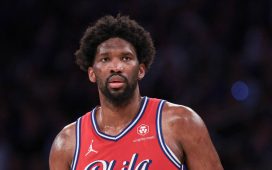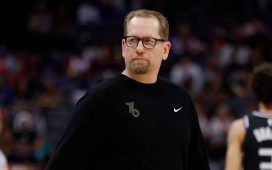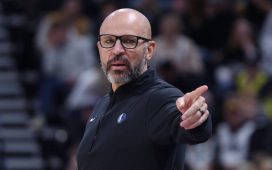A broad range of athletes and sports figures have issued statements on social media condemning the killing of George Floyd and other police violence against African-Americans.
But several N.B.A. players have gone even further. They’ve jumped off the sidelines to join the sprawling protests that have leapt up all over the country, which lines up with an image the N.B.A. has gone to great lengths to cultivate for itself in recent years: that of a socially conscious league that has fought against injustice for decades stretching back to the days of Bill Russell.
This comes with risk for the players: Some of the protests have turned violent and many demonstrators are not wearing masks or maintaining social distancing in accordance with coronavirus pandemic precautions.
Yet very few issues have sparked the outrage of figures in and around the N.B.A. like that of police brutality and the killing of black people, an issue that has touched many black communities in the United States and one that N.B.A. stars, who play in a predominantly black league, have been keen to speak on for several years.
Jaylen Brown, the 23-year-old rising star for the Celtics, said it took him 15 hours to drive from Boston to Atlanta to take part in protests. Brown, who went to high school in Georgia, invited others to join him over the weekend, posting a message on Twitter that said, “Atlanta don’t meet me there beat me there come walk with me bring your own signs.” He added in an Instagram story, “First and foremost, I’m a black man and I’m a member of this community … We’re raising awareness for some of the injustices that we’ve been seeing.”
Malcolm Brogdon, a 27-year-old guard for the Indiana Pacers, also demonstrated in Atlanta this weekend.
“I’ve got a grandfather that marched next to Dr. King in the ’60s, and he was amazing,” Brogdon said to a crowd through a bullhorn. “He would be proud to see us all here.”
And Enes Kanter, the outspoken Celtics center, woke up on Saturday at his manager’s home in Chicago — where he stays during the summer — and made a 20-hour, cross-country drive to join a protest in Boston.
Kanter, while wearing his jersey, appeared with throngs of Black Lives Matter demonstrators in Boston Common, chanting “I can’t breathe.” His teammate, Marcus Smart, was nearby protesting as well.
“It was a crazy drive,” Kanter said Monday. “It felt terrible. My back was hurting. My shoulder was hurting. But you know what? The results were something good so it was worth going.”
The league’s activism has been selective, the N.B.A.’s critics note. It began the season in October with an international incident after a Houston Rockets executive expressed support for pro-democracy protesters in Hong Kong, causing a protracted debate over whether league executives and players caved to China’s anger over it.
The N.B.A. also has a rule banning players from kneeling during the national anthem, the very issue that has been a headache for the N.F.L. because of Colin Kaepernick. That dispute resurfaced after the N.F.L. commissioner, Roger Goodell, issued a statement on Saturday that some players on social media found lacking self-awareness.
But on the subject of the relationship between African-American communities and law enforcement, N.B.A. figures have been much more eager to weigh in and do more — some even feeling a sense of profound obligation to express what they see as grievous injustice.
In response to Floyd’s death, coaches and players have lined up to provide statements, as have teams, some in blunt terms. The Washington Wizards released a statement from its players that said — in capital letters — “WE WILL NO LONGER TOLERATE THE ASSASSINATION OF PEOPLE OF COLOR IN THIS COUNTRY,” adding, “WE WILL NO LONGER ACCEPT THE ABUSE OF POWER FROM LAW ENFORCEMENT.”
In a message to league employees on Sunday, Commissioner Adam Silver said, “Racism, police brutality and racial injustice remain part of everyday life in America and cannot be ignored,” adding, “We will work hand-in-hand to create programs and build partnerships in every N.B.A. community that address racial inequity and bring people together.”
These statements were notable because specific mentions of law enforcement were conspicuously missing from many corporate statements released last week.
In a typical season, N.B.A. players would be able to express themselves at actual games, like in 2014, when many players wore “I Can’t Breathe” T-shirts during warm-ups, a reference to Eric Garner, a black man who died in Staten Island after an officer used a chokehold. Or in 2012, when members of the Miami Heat posted pictures of the team wearing hoodies in response to the death of Trayvon Martin.
But N.B.A. teams are not together currently. The league is aiming to make a return to play in late July. In the meantime, many in the basketball community, like LeBron James, have responded by either spotlighting the protests or gone even further by joining them.
The scale at which the deaths of Floyd, Breonna Taylor — a black emergency room technician who was shot in her own apartment by the Louisville police following the execution of a “no knock warrant” in March — and Ahmaud Arbery — a 25-year-old black man who was pursued by armed white residents in February before being killed — touched a nerve among players and some team executives was on display this weekend.
On Sunday, Maxi Kleber, Dwight Powell, Justin Jackson and Jalen Brunson of the Dallas Mavericks, as well as team owner Mark Cuban, attended a vigil at the Dallas Police Headquarters.
“This is our community. Our country. Both are hurting. I wanted to be there to listen,” Cuban said in an email. “To understand better the pain the African-American community is going through.”
Lonzo Ball, a New Orleans Pelicans guard, posted a picture on Instagram on Sunday of himself attending a protest in Chino Hills, Calif. Jordan Clarkson, a guard for the Utah Jazz, attended one in Los Angeles. Tobias Harris, a Philadelphia 76ers forward, marched in Philadelphia on Saturday. One franchise, the Minnesota Timberwolves, posted a video showing its players, including Karl-Anthony Towns and Josh Okogie, attending a demonstration.
The N.B.A. has sometimes gone farther on issues surrounding violence. In 2015, the league partnered with Everytown for Gun Safety, a group founded by Michael R. Bloomberg, the former New York City mayor, to have players tape messages about the effects of gun violence.
The activism in response to Floyd’s death has not just been limited to N.B.A. players and owners.
Several W.N.B.A. teams have released statements as well. Natasha Cloud, the Washington Mystics guard, posted an op-ed for the Players Tribune on Saturday titled, “Your Silence Is a Knee on My Neck.” Karima Christmas-Kelly, a forward for the Minnesota Lynx, posted an Instagram video on Monday from a demonstration at the intersection where Floyd was killed.
Much of the response has still been from a distance. Multiple N.B.A. coaches announced a committee to combat racism, and all the league’s coaches issued a statement Monday condemning Floyd’s killing, adding, that “the reality is that African-Americans are targeted and victimized on a daily basis.” One of those coaches, Gregg Popovich of the San Antonio Spurs, a frequent critic of President Trump, gave a scathing interview to The Nation on Sunday, blasting Trump’ and his response to the protests.
“We need a president to come out and say simply that ‘Black Lives Matter.’ Just say those three words. But he won’t and he can’t,” Popovich said. “He can’t because it’s more important to him to mollify the small group of followers who validate his insanity. But it’s more than just Trump. The system has to change. I’ll do whatever I can do to help because that’s what leaders do.”
The White House did not respond to a request for comment.





